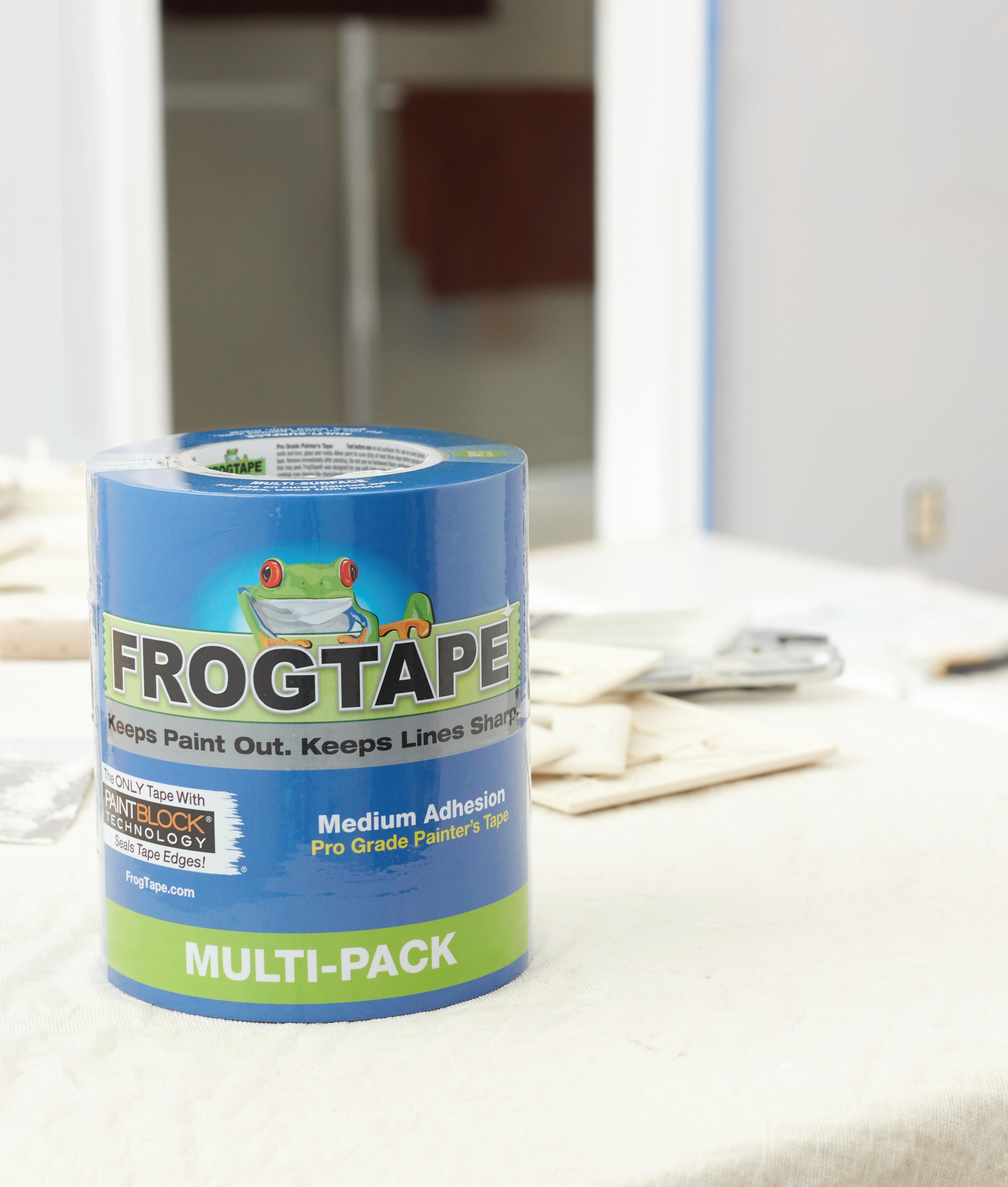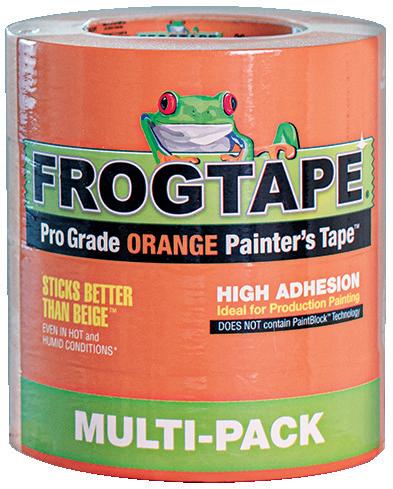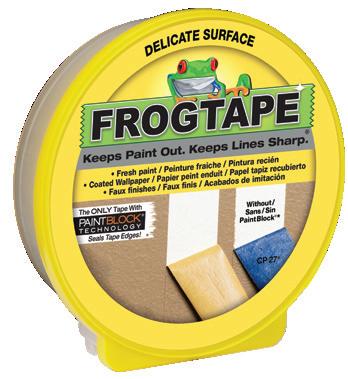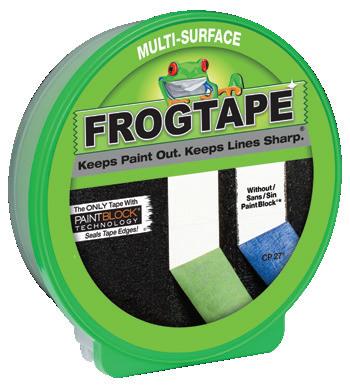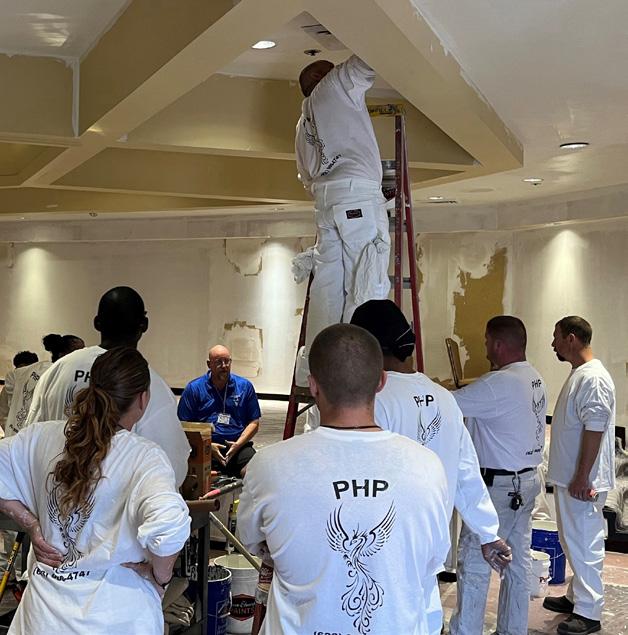
8 minute read
A new approach to hiring
Short on help, an Arizona pro used out-of-the-box thinking to build his crews by tapping into an overlooked population
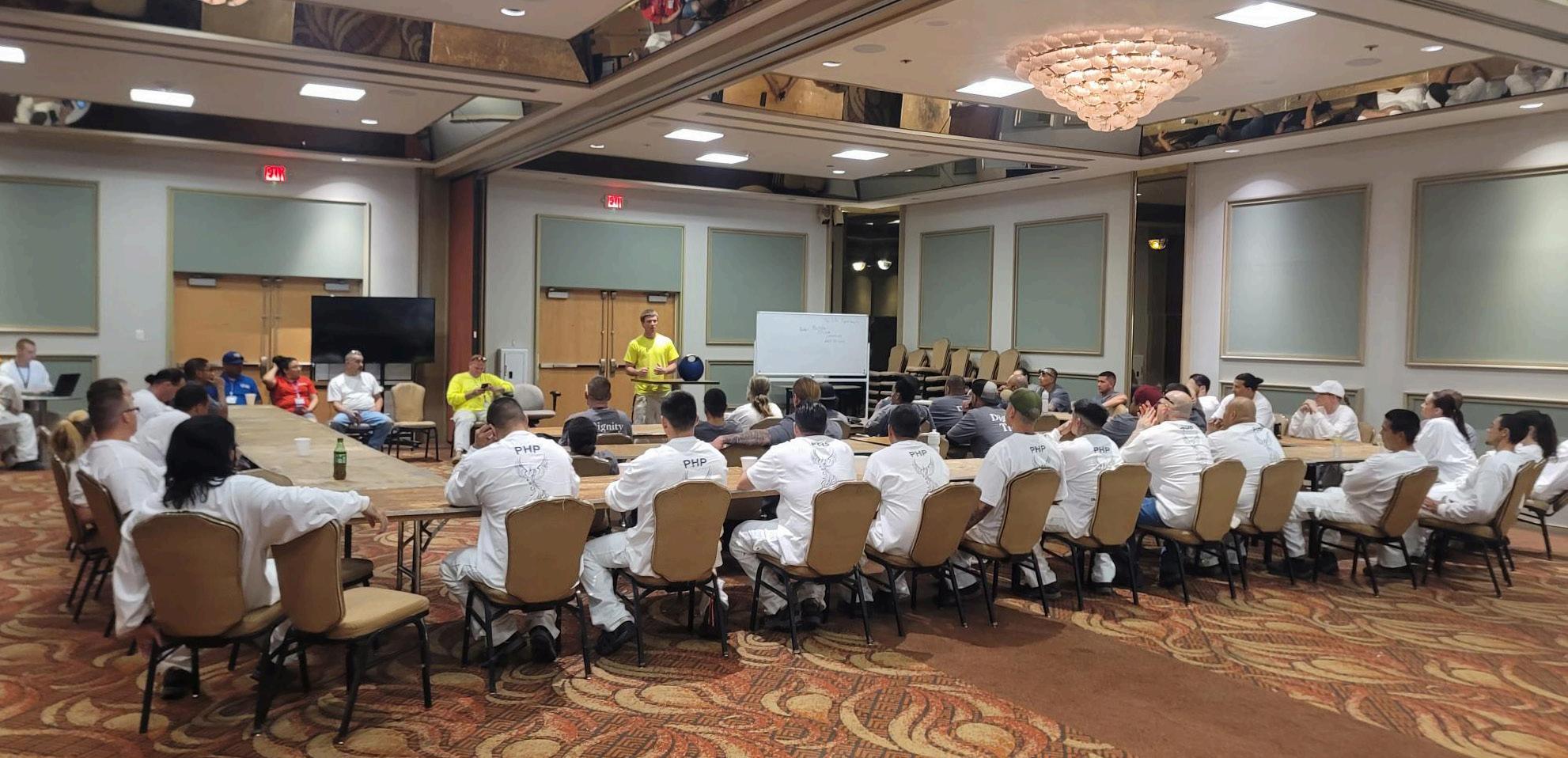
Advertisement
BY BRIAN SODOMA
In early 2022, John Morris was staring down the same labor shortage plaguing other painting contractors around the country. However, the issue had now become a crisis for the owner of PHP Commercial Painting in Phoenix, AZ. He just landed work for Taiwan Semiconductor’s chip manufacturing plant, a project that would require crews of 30 painters, sometimes running double shifts; he only had about 15 pros at the time.
Desperate for options, he called competitors, employment agencies and others. His outreach led him to New Freedom, a new behavioral health facility on the site of a former 400-room central Phoenix hotel. There, those exiting the prison system have 90 days to prepare for life on the outside. After a tour of the site, a light bulb went on for Morris.
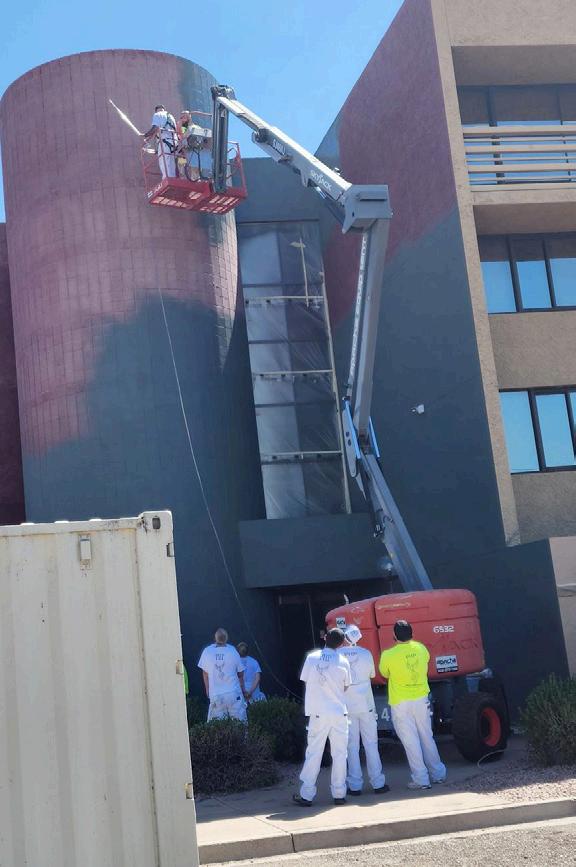
Lending (and finding) a helping hand
Residential reentry centers (RRCs) have been on the rise for the past decade. They aim to help former prisoners find work, write resumes, search for jobs, and learn how to navigate life outside of prison. The Federal Bureau of Prisons (BOP) lists more than 140 RRCs around the country. Despite their popularity, success remains somewhat elusive. Recidivism reports from the Prison Policy Initiative show that 82% of the roughly 650,000 ex-offenders released each year are arrested again within 10 years, most within three.
New Freedom is not found on the BOP list, but it is an RRC, nonetheless. Paid for by Medicaid funds and donations, it helps ease the transition out of prison and into society by providing food, shelter, job-search tools and mental health services for 90 days. When Morris discovered New Freedom, it was relatively new and in the process of developing trade education training run by Vocational Director Justin Proulx, a former tile contractor himself.
“It was January 2022 and I was touring the facility and talking to them; my eyes were lighting up and the wheels started to turn,” Morris recalled. “I saw an answer and kept thinking ‘yeah, but how do I make this work?’ … So, I started by asking [them] ‘What if I come down on weekends to teach them to brush and roll, and see if I get any takers?’”
Going all in
The request was music to Proulx’s ears. Morris’ first 4-week class, in late February 2022, had 25 participants; 18 finished. With trainees ready and eager to work, success posed another problem.
“I can’t onboard 18 guys at once,” he said, “so, I started reaching out to my competition” to see if they were hiring.
As Morris worked to get other local pros involved, he refined his 4-week class to include Saturday and Sunday skills training, along with Tuesday and Wednesday night employment and soft-skills training. The latter component has proven critical. Morris’ chief tenet there is: If you’re not 10 minutes early, you’re late.
“I wrote the entire curriculum on everything from how to be a good employee to drugs in the workplace … you name it. I was donating 20 hours per week. I’m on my 12th class and this has changed everything about my business,” Morris said. “At one point, I was thinking I was going to lose that contract; then I had more than enough labor.”
Transitional support to ensure success on the outside
Daniel ‘DJ’ Szentendrei was in Morris’ first class. In his past life, he’d earned respect on the streets by robbing drug dealers, until the law caught up with him. At 31, he left prison after serving 9.5 years. Now, he works for Morris and has channeled his enthusiastic personality more constructively. Morris is now training him to be an estimator and in other facets of the business. While at New Freedom, the Tuesday and Wednesday job skill classes were particularly illuminating for Szentendrei.
“What I learned was that I’m not defined by what I did or where I came from,” he said. “I’d say the person I am today is from the painting classes and from John with his Tuesday and Wednesday classes. He gives it to you raw. You learn how to be a responsible adult and keep a job.”
Mike Cassel is an assistant project manager for PHP Commercial Painting. He had experience as a general contractor superintendent before he was sent to prison for 2.5 years on a drug-related offense. Cassel was released in June 2022, but painting was the last thing on his mind at that time.
“Honestly, I can remember sitting in my cell and seeing these newsletters that they would send out with these big articles and laughing and thinking ‘Who on Earth wants to be a painter?’” he recalled.
With more trades signing on at New Freedom at the time, Cassel completed the tile class, but there wasn’t a job immediately available. Then Morris asked him if he knew how to read blueprints. Cassel did and Morris took him on.
“If I hadn’t gotten into New Freedom I don’t know where I’d be at all, honestly. With New Freedom, you can get going, and John goes way above and beyond what employers do for you,” Cassel added.
Setting realistic expectations
Morris and other contractors admit that not every new hire is a good fit. There are some inherent, as well as unseen, challenges that come with hiring from this population.
“We have hired 78 over the last year and we still have 35 with us currently,” Morris noted. “Some have moved on to other things, realizing that painting wasn’t for them. Others have gone to other painting companies that were a better fit for them.”
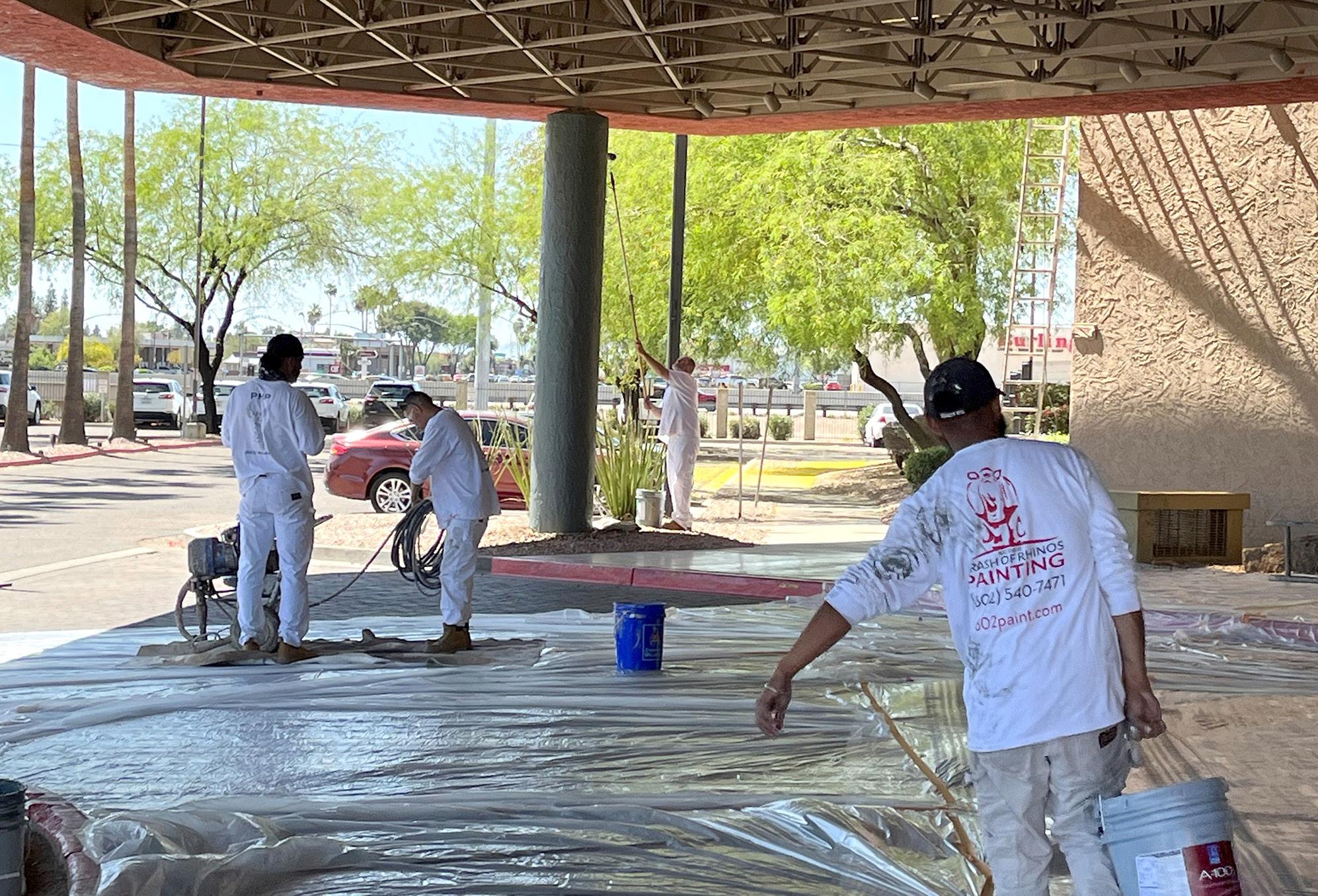
Randy Fornoff, owner of MTS Painting, in Phoenix, helps teach weekday classes with Morris and has hired a few painters from the training class. Fornoff admits he has not had the greatest luck with them but will still hire more in the future. His late son had his own brushes with the law and eventually lost his life to drug addiction, so Fornoff feels ‘called’ to stay involved with the training class and give more hires a chance.
“In my opinion, this is the future of the construction industry,” he said. “There are just not enough people going into the trades. This is called a second chance movement, but for some of these guys who have never had a job their whole life; for them, it’s the first chance they’ve ever had.”
Rick Augustine, of R and R Painting, in Phoenix, has hired six employees who went through New Freedom vocational training and still has two. That doesn’t mean the decisions have been a failure, he clarified. Some find the work too physically demanding, some will relapse into drugs or crime, he added, and, reiterating Morris’ comment, others will simply find different work. Augustine, who has also been a guest speaker and weekend trainer, says Morris’ training class is still his go-to for finding help. The reason, he explains, comes from too many job-hopping painters in his area. Yes, they have experience, but little in the way of loyalty.
“With those hires, I’m batting zero. We all know who those guys are; as owners, we all talk,” he emphasized. “In our business, ‘green’ guys have no bad habits and you can train them to be what you need them to be. I don’t have a problem with their backgrounds. If you put them in a good setting with seasoned pros who can monitor and facilitate things, it can work. We prefer to pull out of New Freedom … when we get busy, that’s exactly where we go.”
The vocational training class hits a personal note for Augustine as well. While he never did prison time, he had a felony on his record. He completed a college degree but couldn’t climb the corporate ladder because of it. He turned to painting and found a career. “I know that feeling of having a door shut on you,” he added, “and I talk about it in my speeches. You can’t BS these guys; they’ve been yanked around enough.”
A different kind of commitment
Fornoff, Morris and Augustine all acknowledge that a New Freedom hire requires some extra work for the business owner, too. For one, contractors should count on being involved in helping the new employee find a ride to the job for the first few months, maybe even up to a year. Transportation and housing are big barriers for this population. For any ex-offender, it’s almost impossible to rent an apartment and it can even be difficult to reapply for a driver’s license with a felony, Proulx explained.
“It’s a situation where you take away their rights and lock them up, but how do you set them free?” he said. “Their mindset becomes imprisoned, and there’s more to it than job searches in order to get them out there and working. There are barriers, and this effort really takes everybody[’s patience and buy-in].”
Sober-living housing, or transitional houses for those exiting drug or alcohol rehabilitation programs, has been one option for Proulx, but he acknowledges these homes can quickly turn into a bad situation if tenants relapse without a support system in place. So, he uses a placement strategy to create a good culture at each home. New Freedom pairs members who are Peer Support specialists (individuals who overcame traumarelated challenges and are trained to support others facing similar challenges) with other New Freedom participants in a home. This way they can support one another to stay on track to self-sufficiency. If one of them has a driver’s license and has saved for a car, then that person can also drive others to work. In some cases, employers have even donated vehicles for use.
Daren Strunk is the COO of St. Joseph the Worker, another Phoenix-based nonprofit that offers transitional support for those with a criminal history. His organization worked with New Freedom early on to help 537 participants with tools and work clothes. He said employers’ extra commitment to ensure transportation needs are met pays off in the long run.
“It’s our mission to help any client with barriers by providing opportunity and a pathway to success,” he said. “You can find really great employees that stick and are incredibly loyal and willing to help the next person who comes in behind them.”
Hope for the future
News of New Freedom’s success is spreading, Proulx said, and he believes models like this will expand around the nation, especially with the growing demand for skilled labor. Associated Builders and Contractors reports the construction workforce shortage reached 546,000 this year.
“This is a movement that will sweep the nation,” Proulx noted. “People are getting out of prison and many people are exiting the workforce. … What we do here saves taxpayers millions. They get out and now they’re paying taxes instead of being a tax burden. They go from being a liability to an asset … and who’s going to build the nation if you don’t have labor?”
As for Morris, he is not slowing down one bit. New Freedom has now grown to its maximum capacity of 400 people (from 100 when he first arrived), and he sees tremendous promise going forward.
“This has completely changed the way I look at people,” he added. “It drives me nuts to hear so many guys complaining they can’t find help—and they don’t do anything about it. … Sure, not everyone works out, but some of these guys have fast-tracked themselves into higher positions in my company.” ■
If you have questions about New Freedom or about starting a similar training effort in your area, contact John Morris of PHP Commercial Painting at john@phppainting.com
